MyDigitalSSD BPX Pro NVMe SSD Review: Big on Endurance, Small on Price
Why you can trust Tom's Hardware
MyDigitalSSD BPX Pro (1.92TB)
Pros:
- Price
- Capacity
Cons:
- Small SLC cache capacity
- Could use further performance optimization
Verdict: MyDigitalSSD’s 1.92TB BPX Pro comes with a very hefty endurance of 3115 TBW, or about eight times that of the Intel SSD 660p. While it isn’t a chart-topper in application performance, the 1.92TB BPX Pro still offers plenty of performance and high capacity for a great price. At just $229.99, it's one of the cheapest 2TB SSDs available and earns our recommendation.
Rating: ★★★★
Comparison Products
At 1.92TB, we pit the MyDigitalSSD BPX Pro against some other high capacity competitors, all with the latest firmware. We have the Samsung 970 EVO Plus and HP SSD EX950 at 2TB: The Samsung boasts Samsung’s Phoenix controller and latest 9x layer TLC V-NAND while the HP comes in with a combination of Silicon Motion’s SM262EN and Micron’s 64L TLC. We also included the fastest and highest-capacity Intel Optane-infused product, the 1.5TB 905P. And, for comparison's sake, we’ve added in results from a SATA 1TB Samsung 860 EVO.
Game Scene Loading - Final Fantasy XIV
The Final Fantasy XIV StormBlood benchmark is a free real-world game benchmark that easily and accurately compares game load times without the inaccuracy of using a stopwatch.
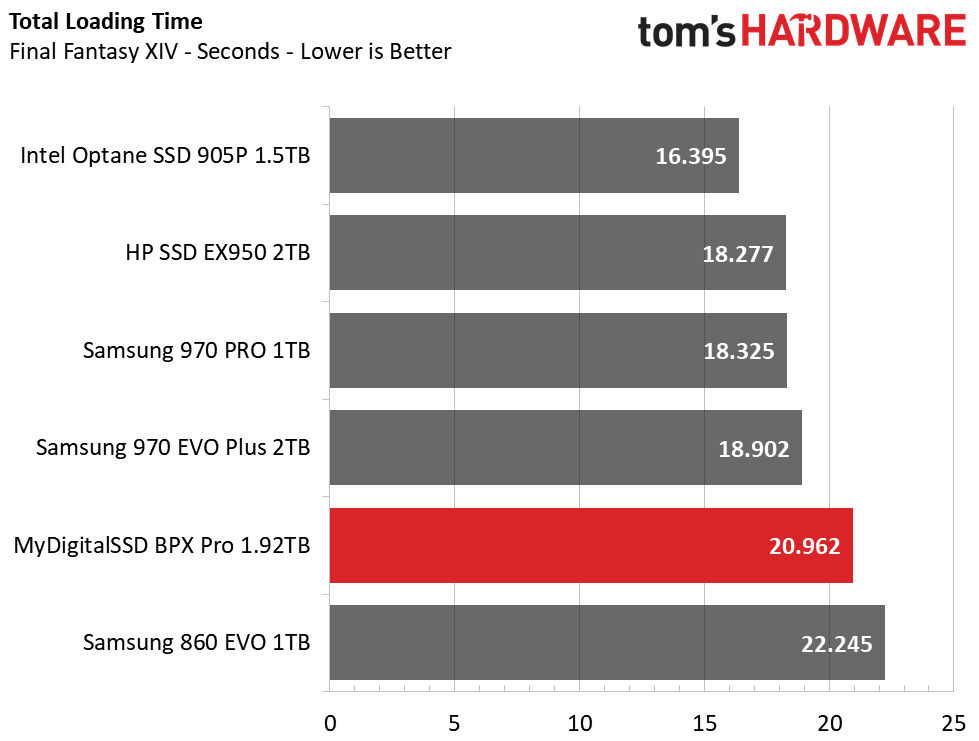
During this game scene load test, Phison’s E12 has traditionally lagged behind other NVMe controllers on the market. This still holds true at the 2TB capacity point. With a total load time of 21 seconds, it ranks last amongst the other NVMe SSDs in our comparison pool, but is still fast enough to outpace the Samsung 860 EVO by about a second.
Get Tom's Hardware's best news and in-depth reviews, straight to your inbox.
Transfer Rates – DiskBench
We use the DiskBench storage benchmarking tool to test file transfer performance with our own custom 50GB block of data. Our data set includes 31,227 files of various types, like pictures, PDFs, and videos. We copy the files to a new folder and then follow up with a reading test of a newly-written 6 GB file.
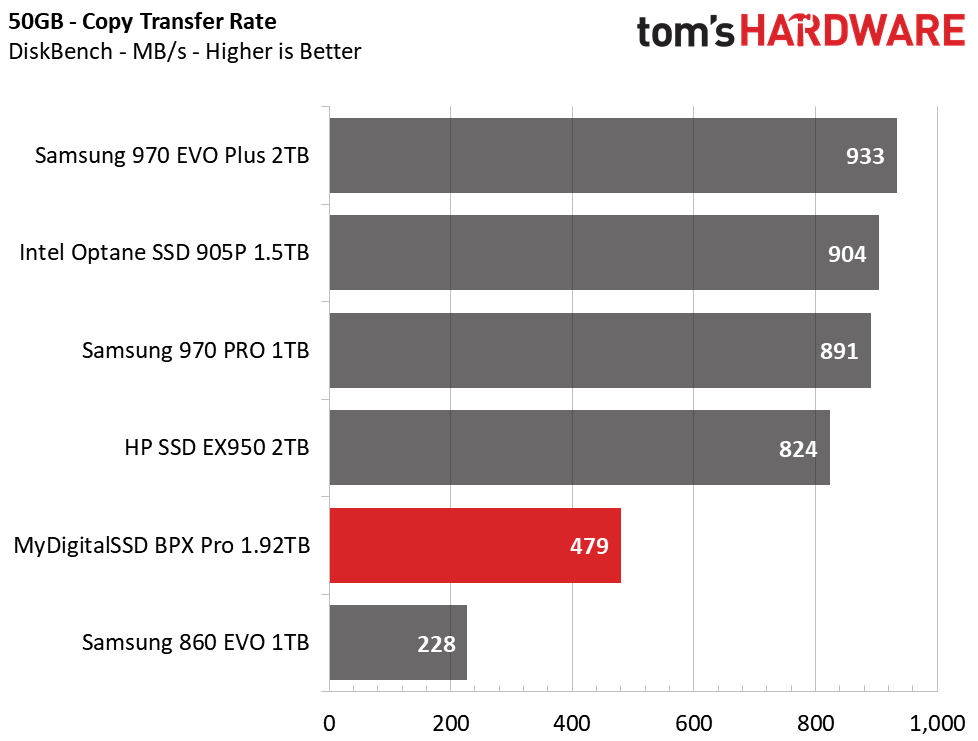
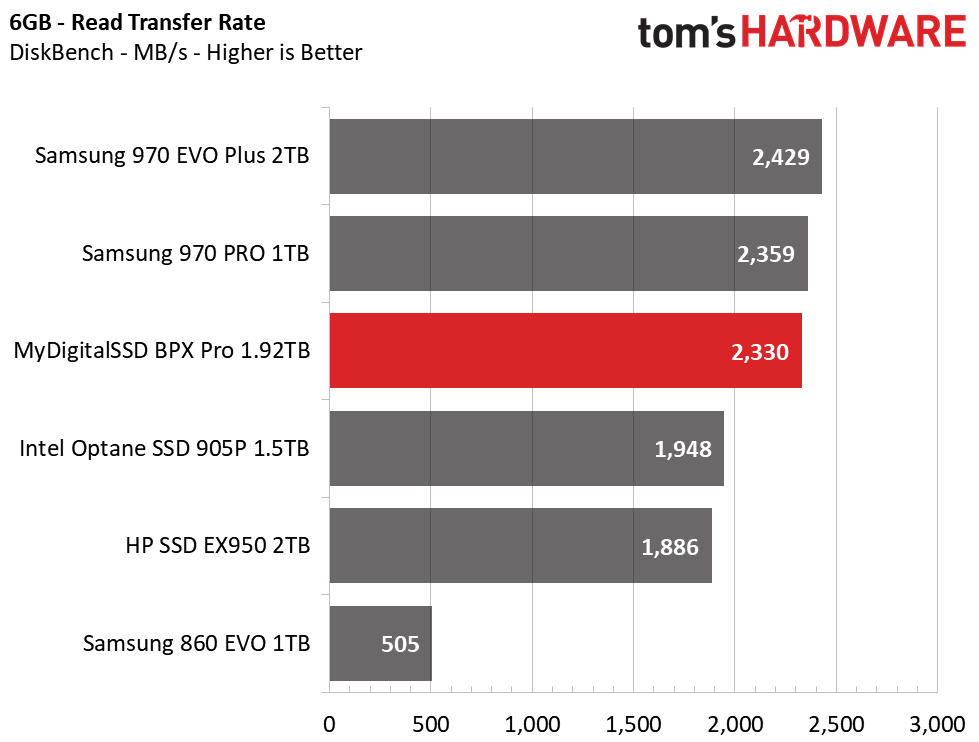
While the MyDigitalSSD BPX Pro can write at a pace of up to 3GB/s from other sources, it doesn’t fare too well in our file copy test to and from the drive itself. With an average transfer rate of 480MB/s, it delivers double the performance of the SATA 860 EVO, but still comes in second to last place with half the performance of the rest of the comparison pool.
Read performance is still great, though. With a read speed of 2.3GB/s, it read our 6GB file in under three seconds, ranking third in this test.
Trace Testing – PCMark 8 Storage Test 2.0
PCMark 8 is a trace-based benchmark that uses Microsoft Office, Adobe Creative Suite, World of Warcraft, and Battlefield 3 to measure the performance of storage devices in real-world scenarios.
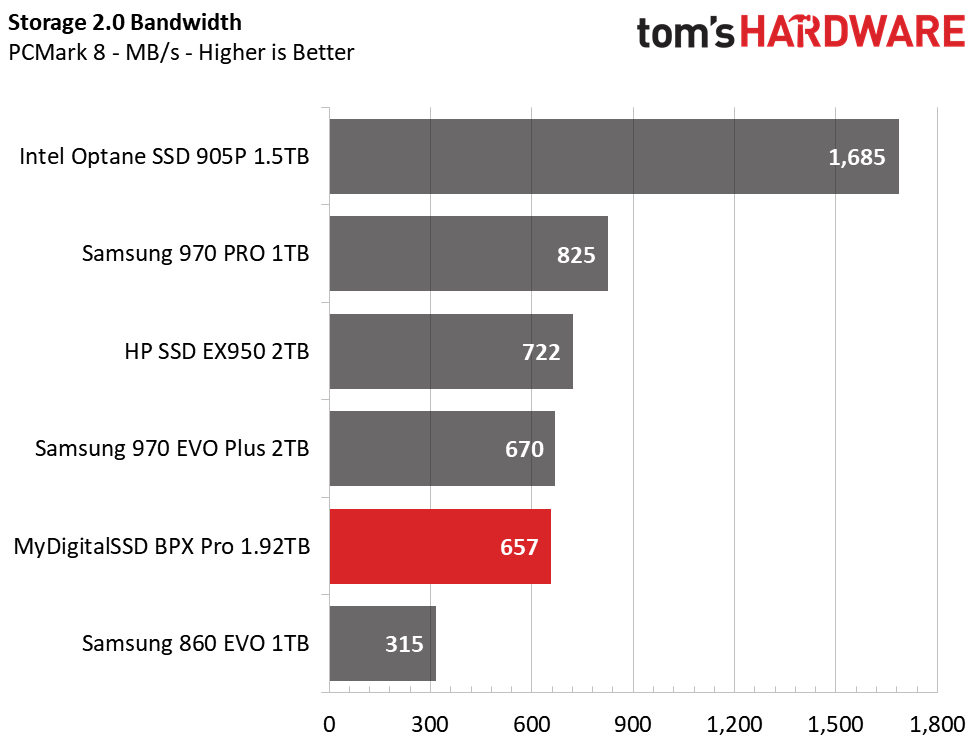
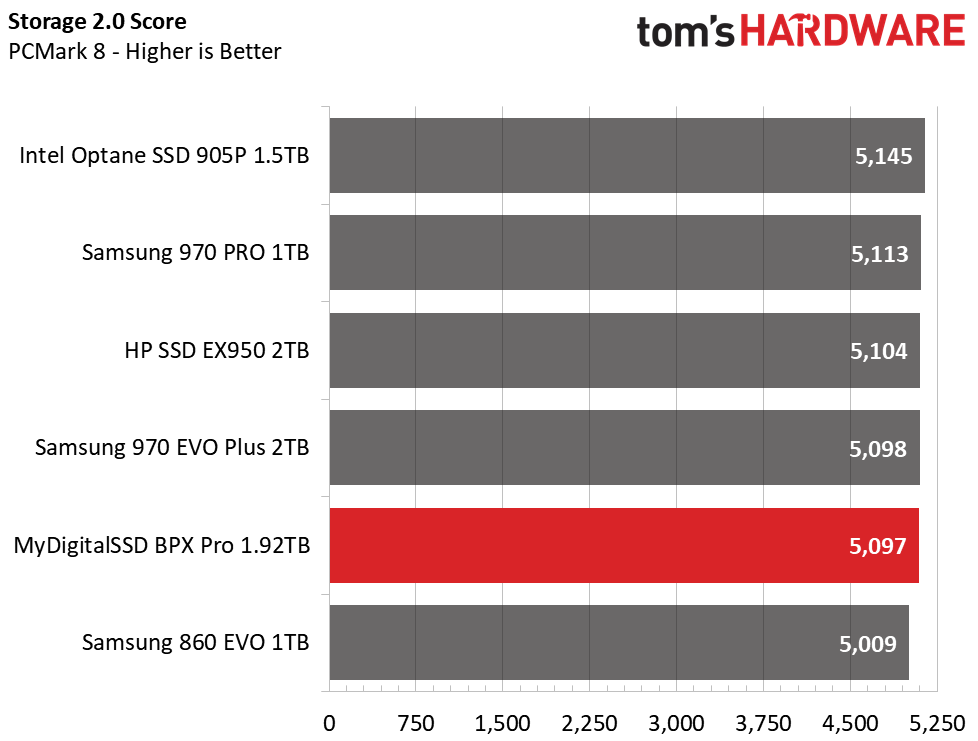
In PCMark 8, again, the BPX Pro outperformed the SATA 860 EVO but lagged behind the rest of the NVMe pack. With a score of 5,097 points and an average bandwidth of 657MB/s during the run, the BPX Pro comes in fifth place overall.
Trace Testing – SPECworkstation 3
Like PCMark 8, SPECworkstation 3 is a trace-based benchmark, but it is designed to push the system harder by measuring workstation performance in professional applications. The full suite consists of more than 30 workloads, but we've opted to only run the storage benchmark which uses only 15 of them and categorizes the results into 5 market segments for scoring: Media & Entertainment, Product Development, Life Sciences, Energy, and General Operations.
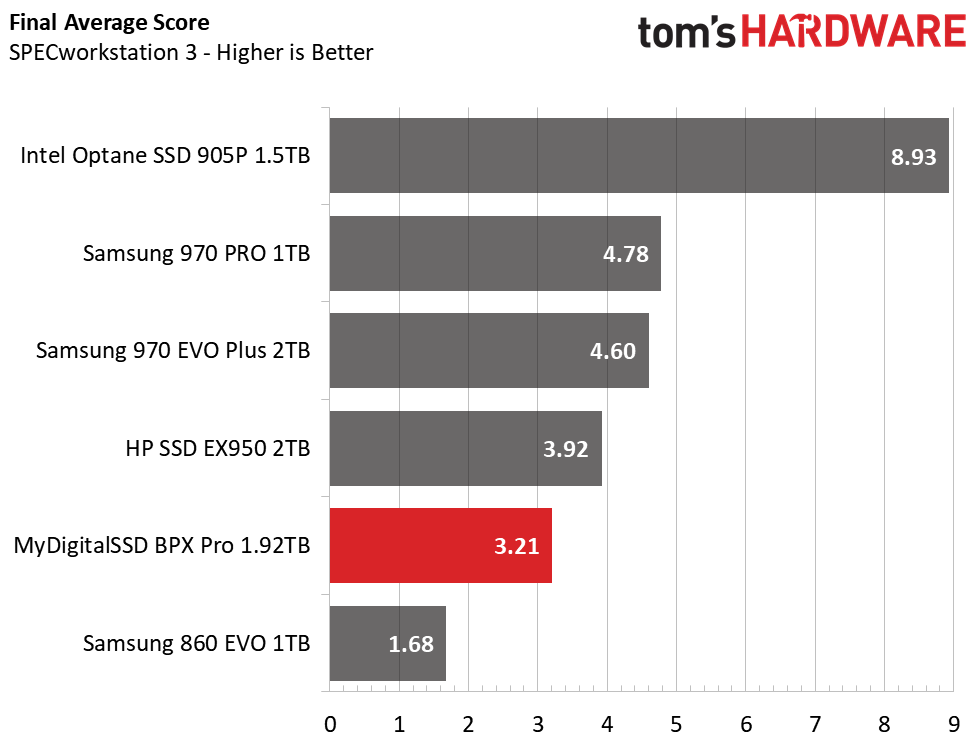
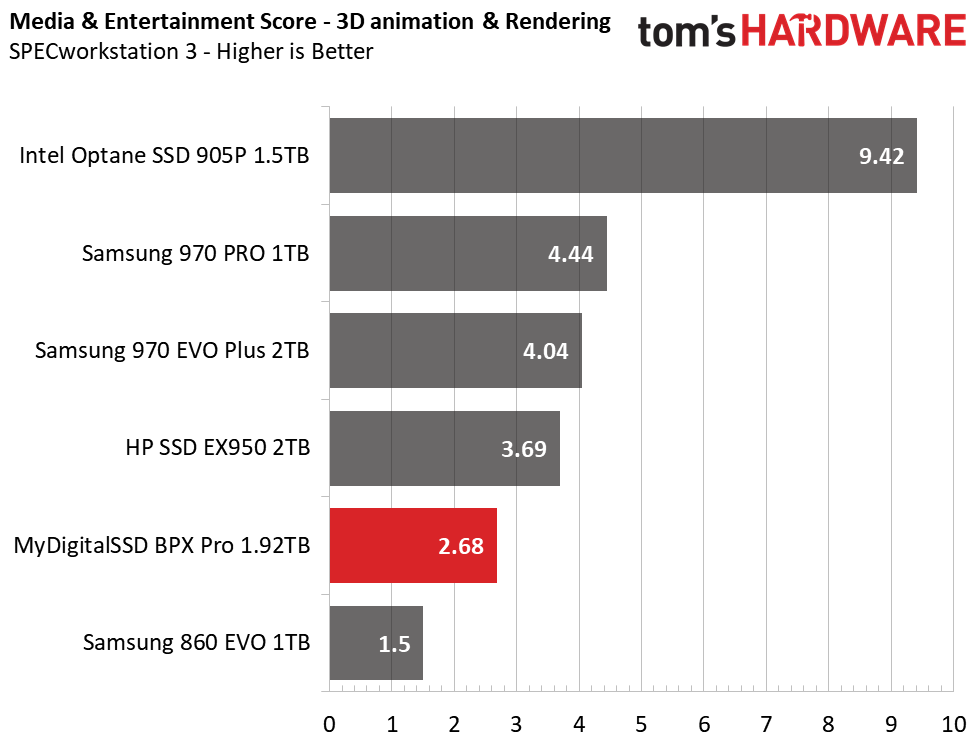
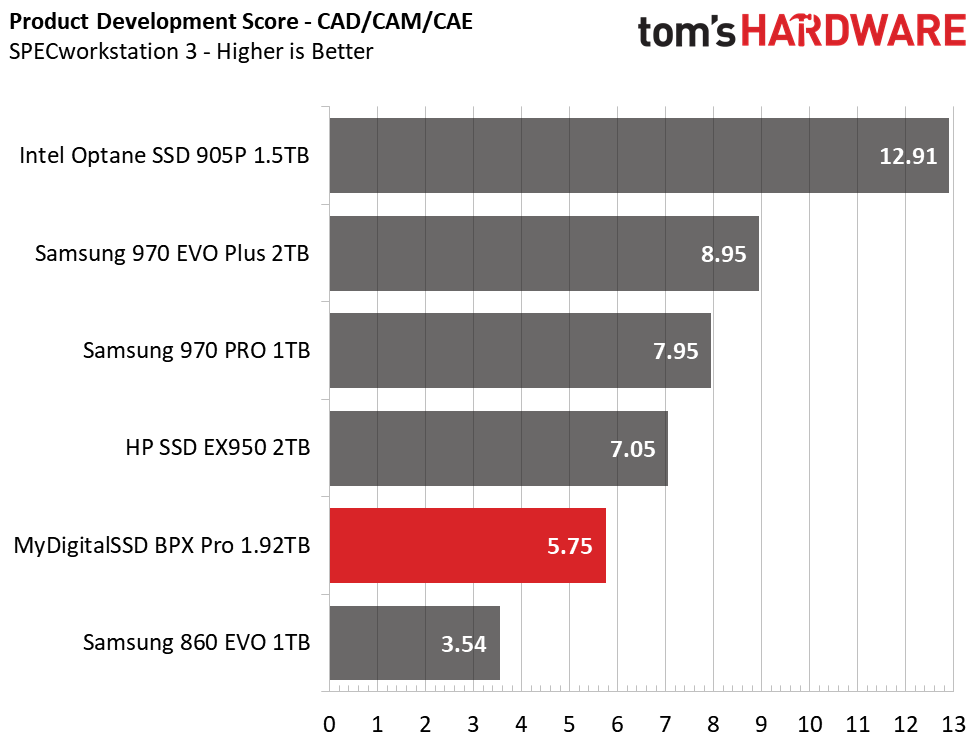
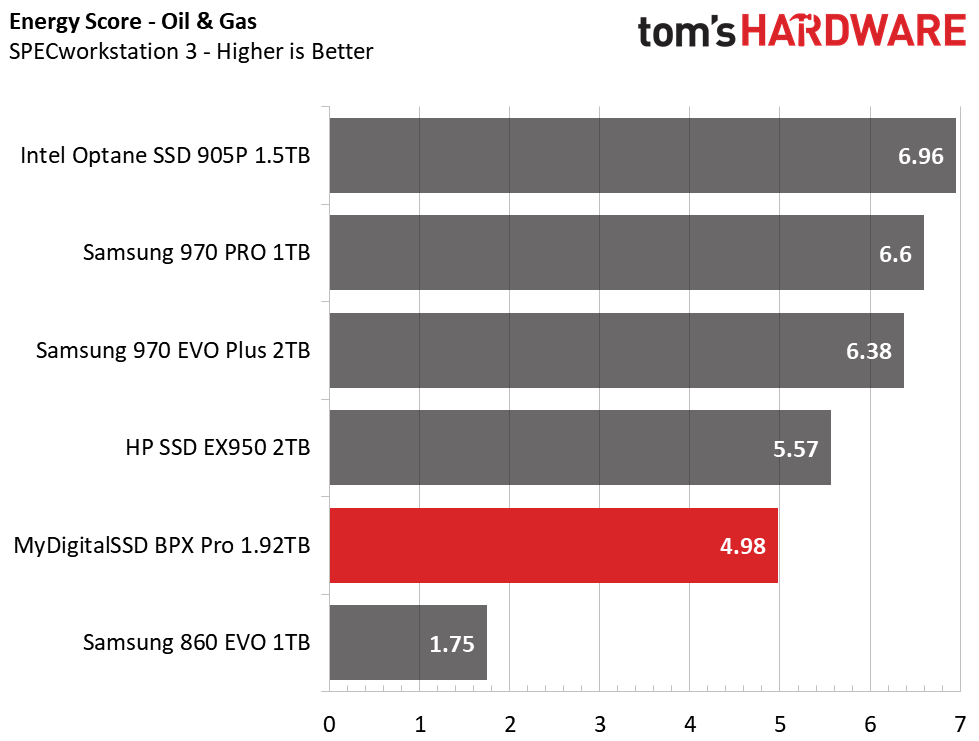
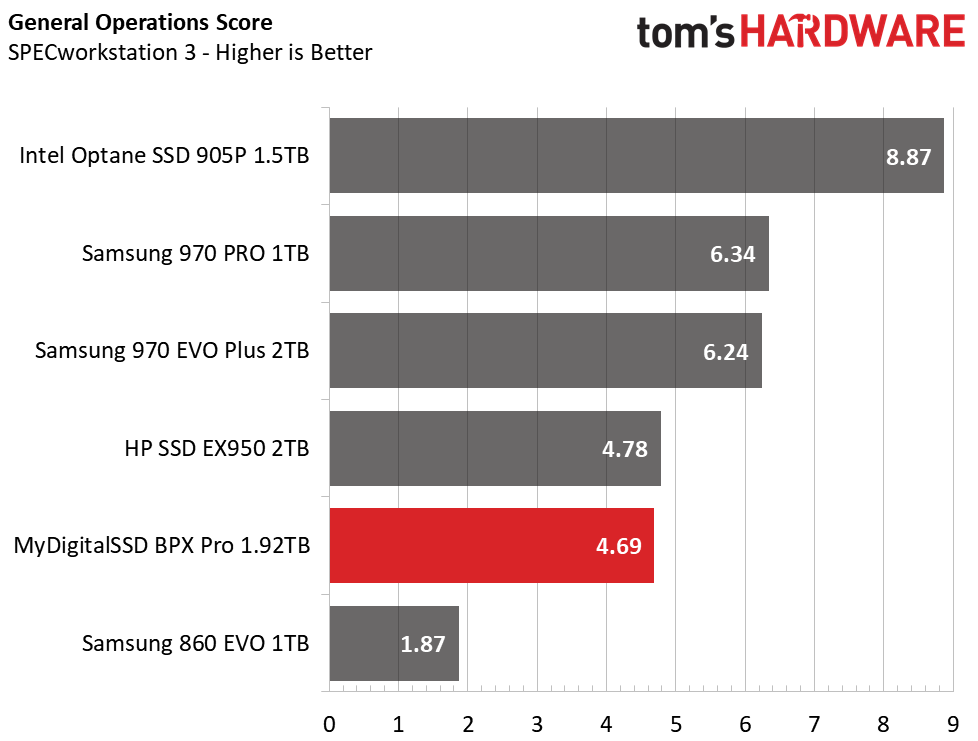
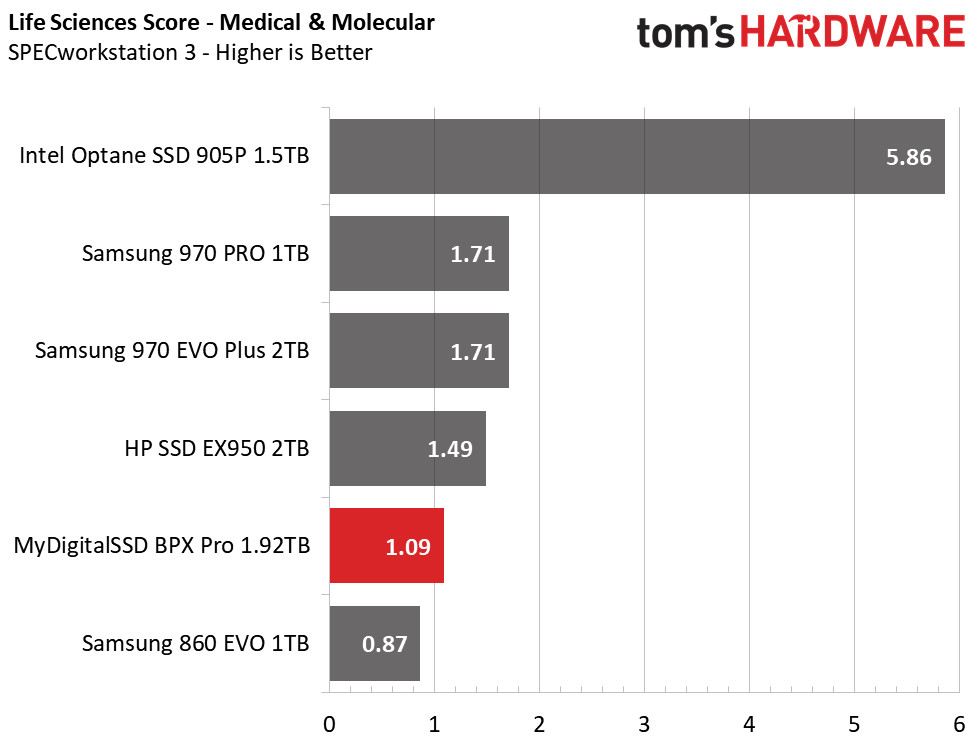
Just as in PCMark 8, the BPX Pro comes in second to last place with a score that is double that of the 860 EVO, but still just can’t compete with the faster Samsung, Intel, and HP SSDs. For general operations and most workloads, the MyDigitalSSD BPX Pro is a decent drive, but there are better options if you are looking for the utmost workstation performance out of your device.
Synthetics - ATTO
ATTO is a simple and free application that SSD vendors commonly use to assign sequential performance specifications to their products. It also gives us insight into how the device handles different file sizes.
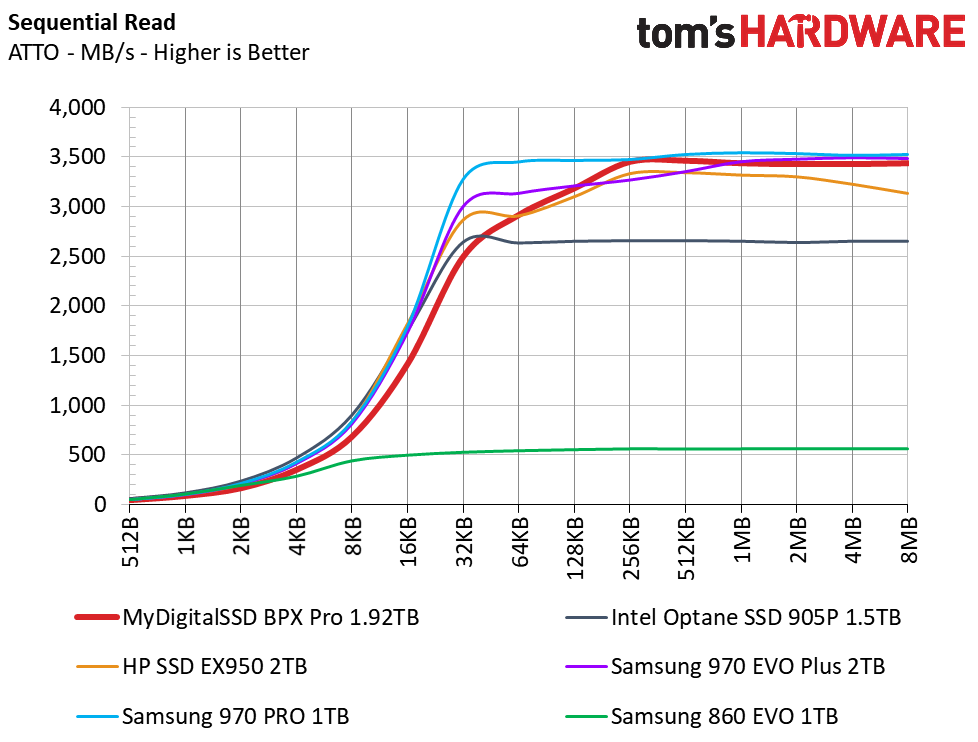
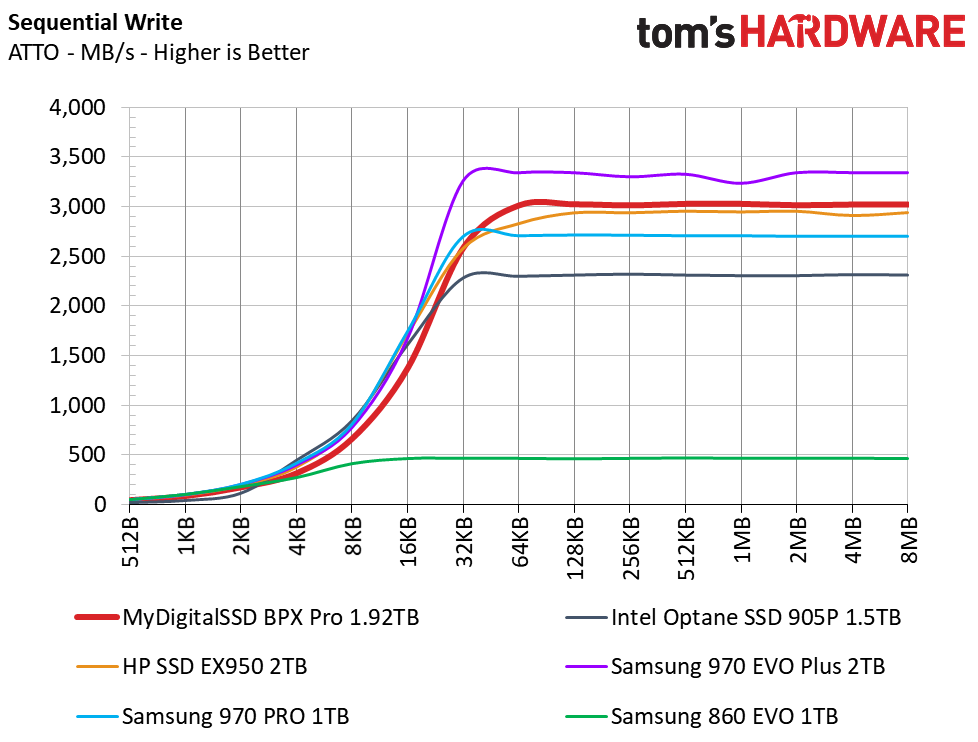
The 1.92TB MyDigitalSSD BPX Pro’s read speed takes a bit longer to ramp up compared to the rest of the NVMe pack. Overall, its sequential read and write performance peaked at 3,463MB/s and 3,033MB/s, respectively, which is roughly six to seven times the throughput you can achieve with a SATA SSD.
Synthetics - iometer
iometer is an advanced and highly configurable storage benchmarking tool that vendors often use to measure the performance of their devices.
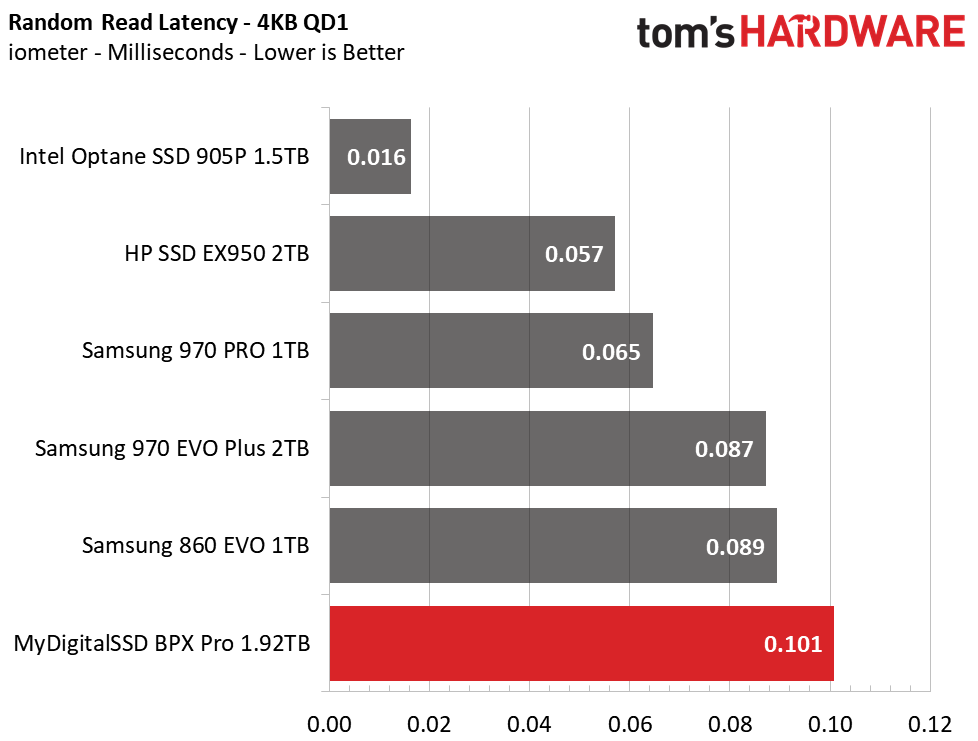
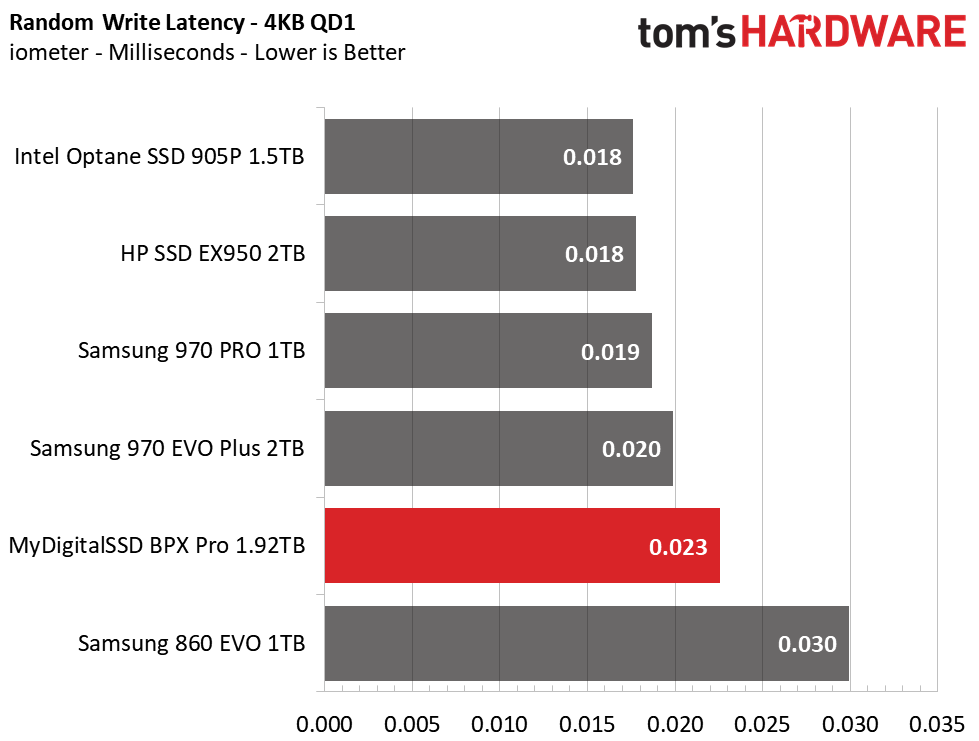
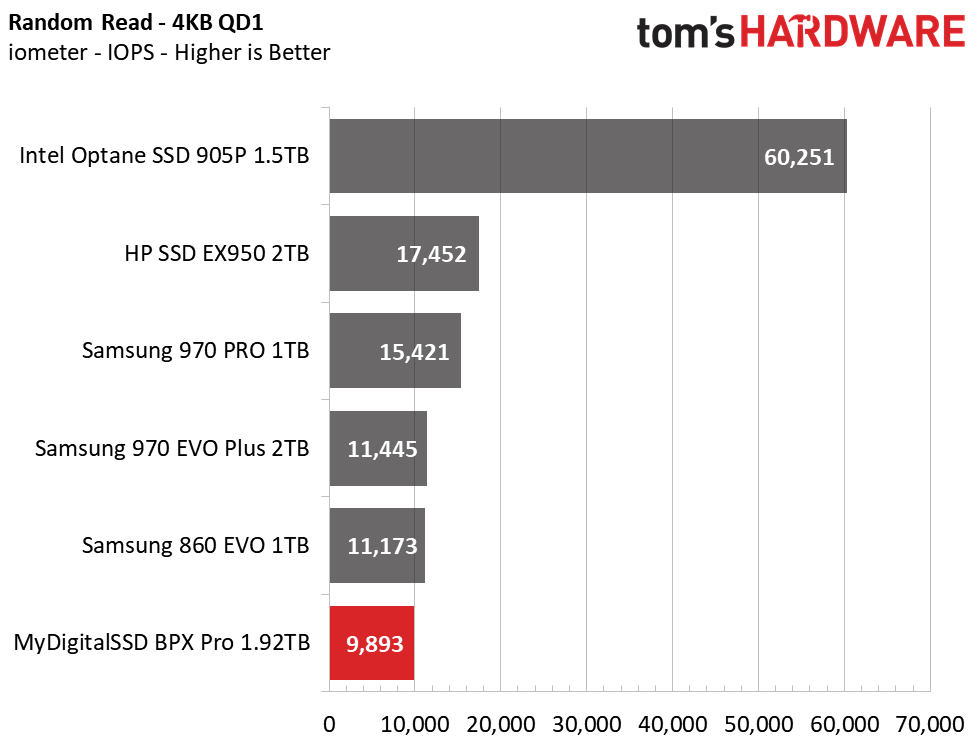
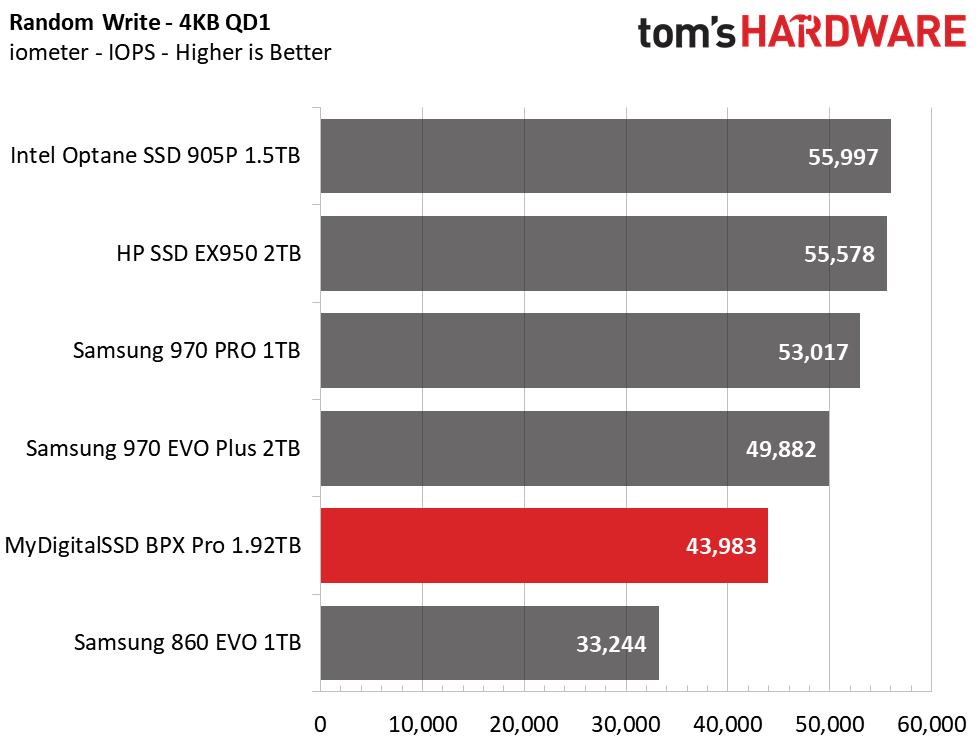
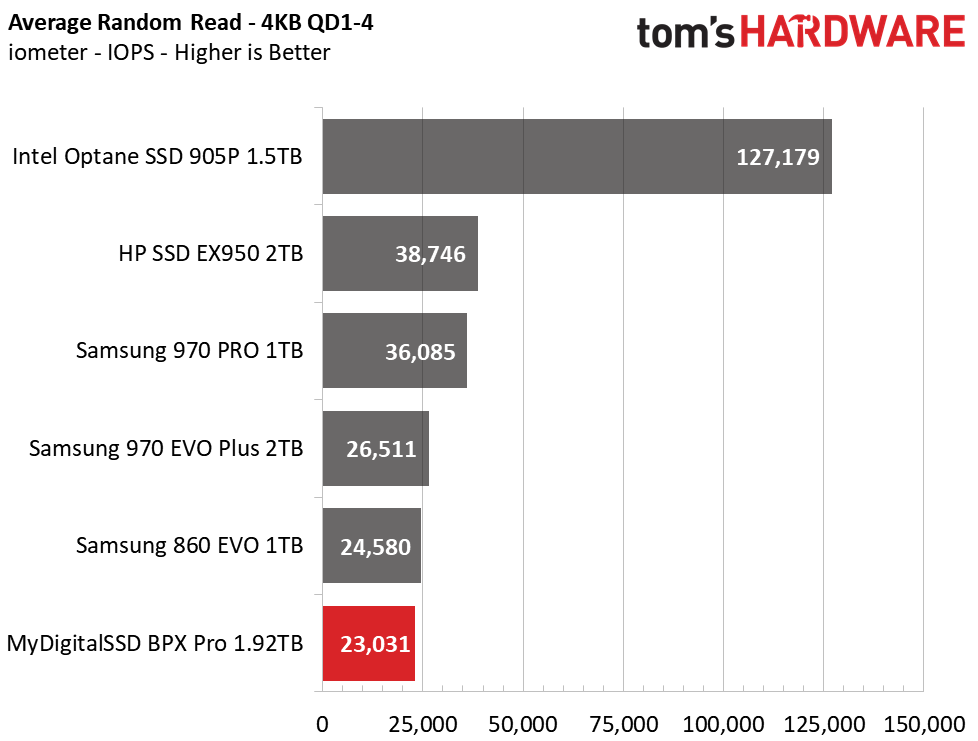
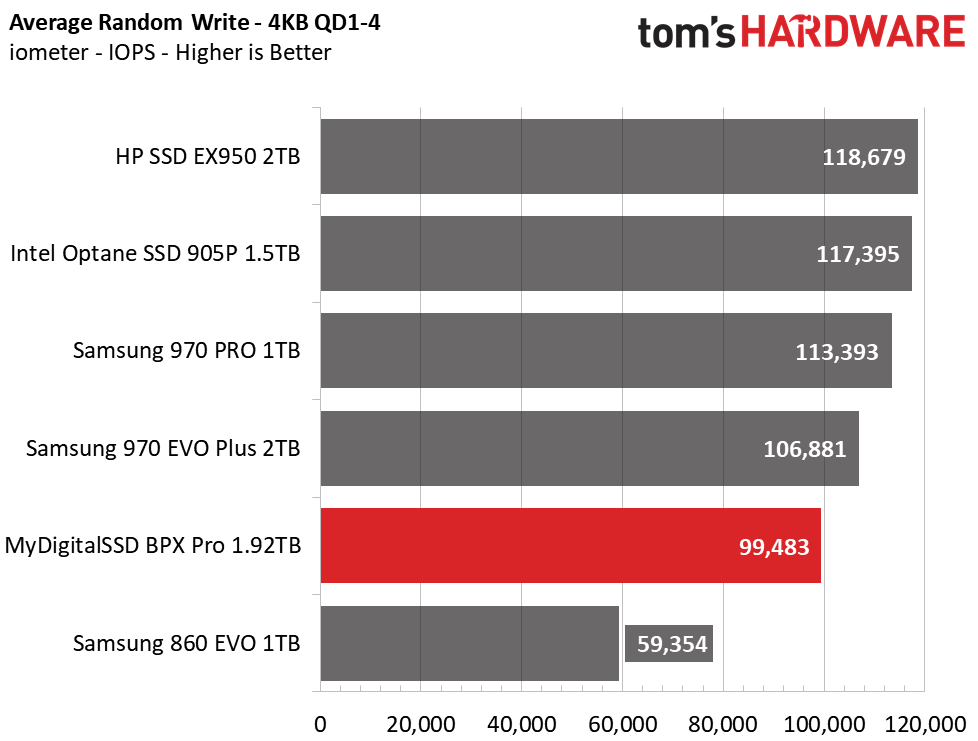
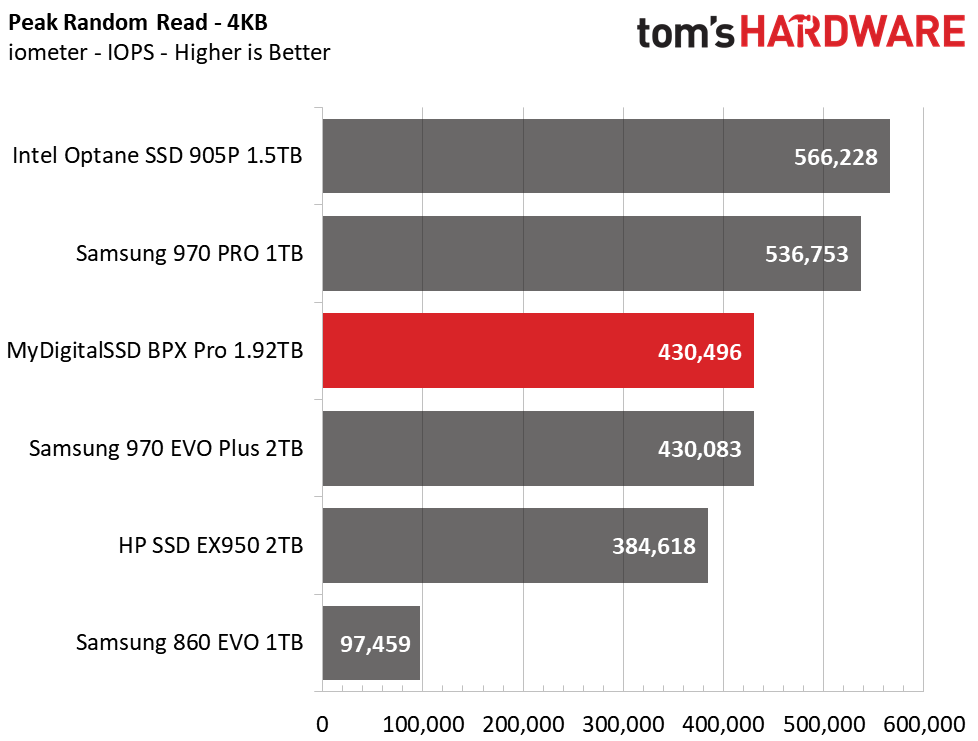
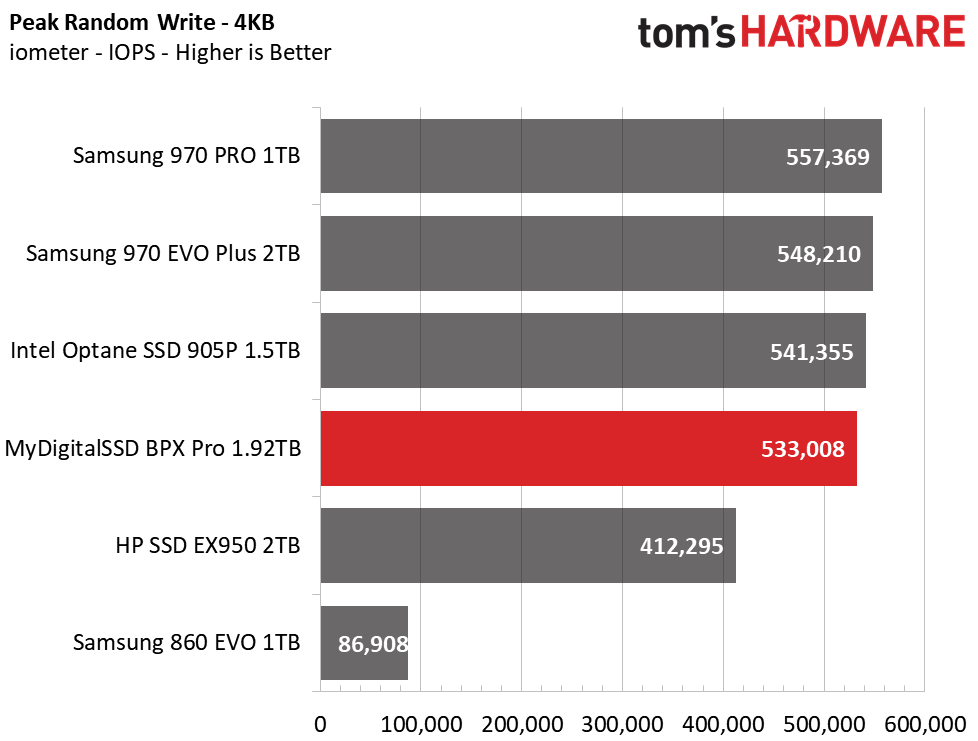
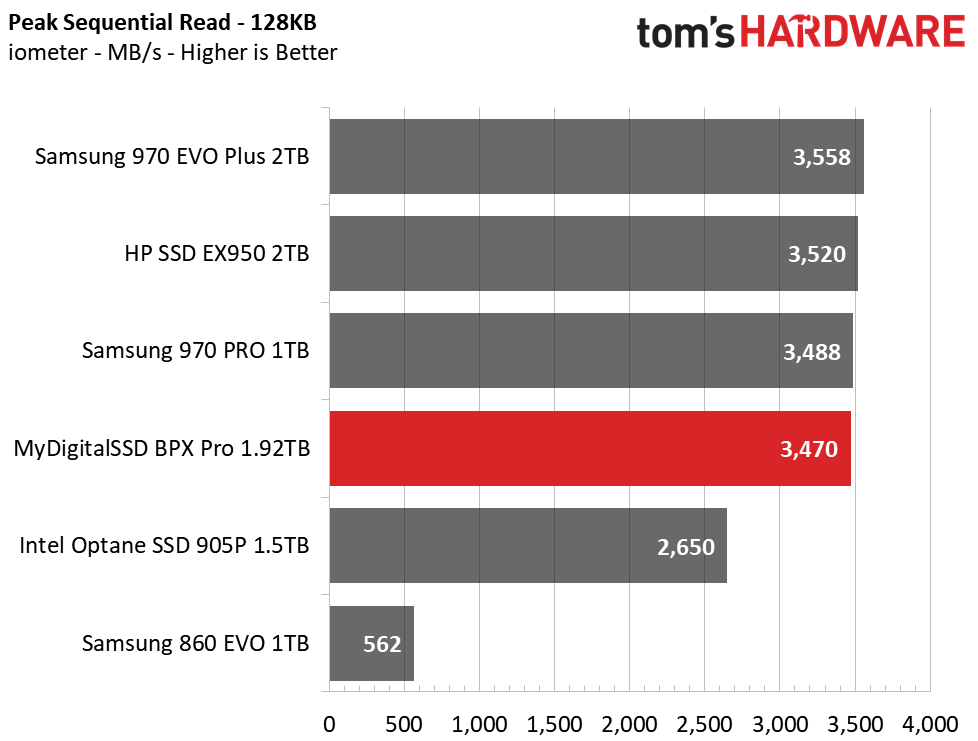
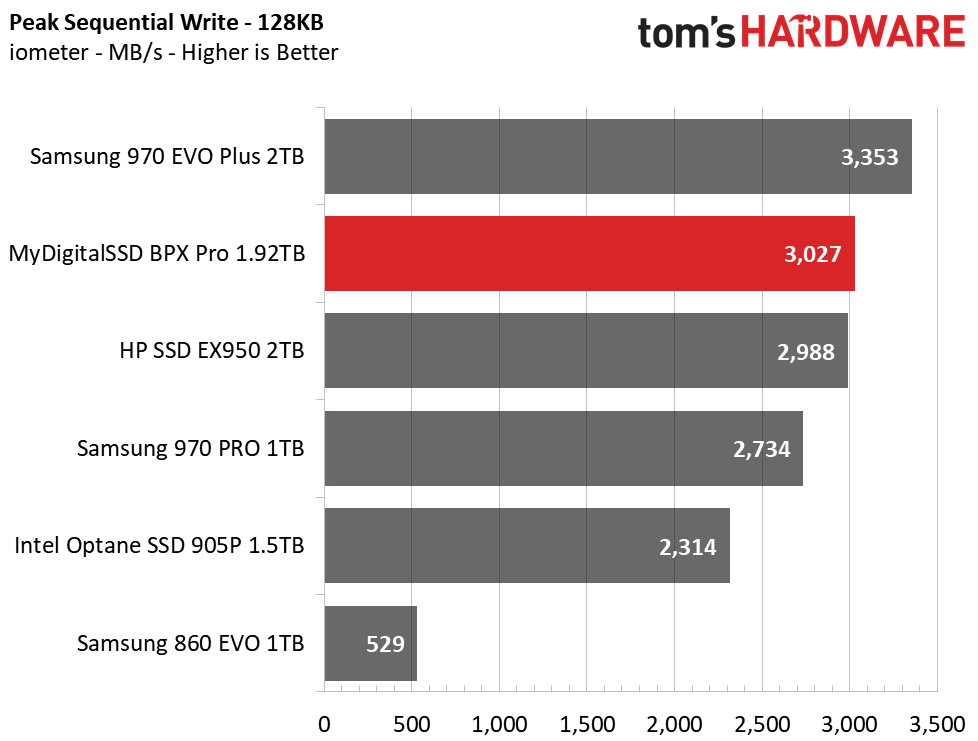
The MyDigitalSSD BPX Pro peaks at 3,470MBps read and 3GBps write. Looking at the response time in both reads and writes as well as the average of QD1-4, the slightly lower than average application performance becomes apparent. The drive comes in last or second to last in random performance, with some figures lagging behind even the Samsung 860 EVO.
Sustained Sequential Write Performance
Official write specifications are only part of the performance picture. Most SSD makers implement an SLC cache buffer, which is a fast area of SLC-programmed flash that absorbs incoming data. Sustained write speeds can suffer tremendously once the workload spills outside of the SLC cache and into the "native" TLC or QLC flash. We use iometer to hammer the SSD with sequential writes for 15 minutes to measure both the size of the SLC buffer and performance after the buffer is saturated.
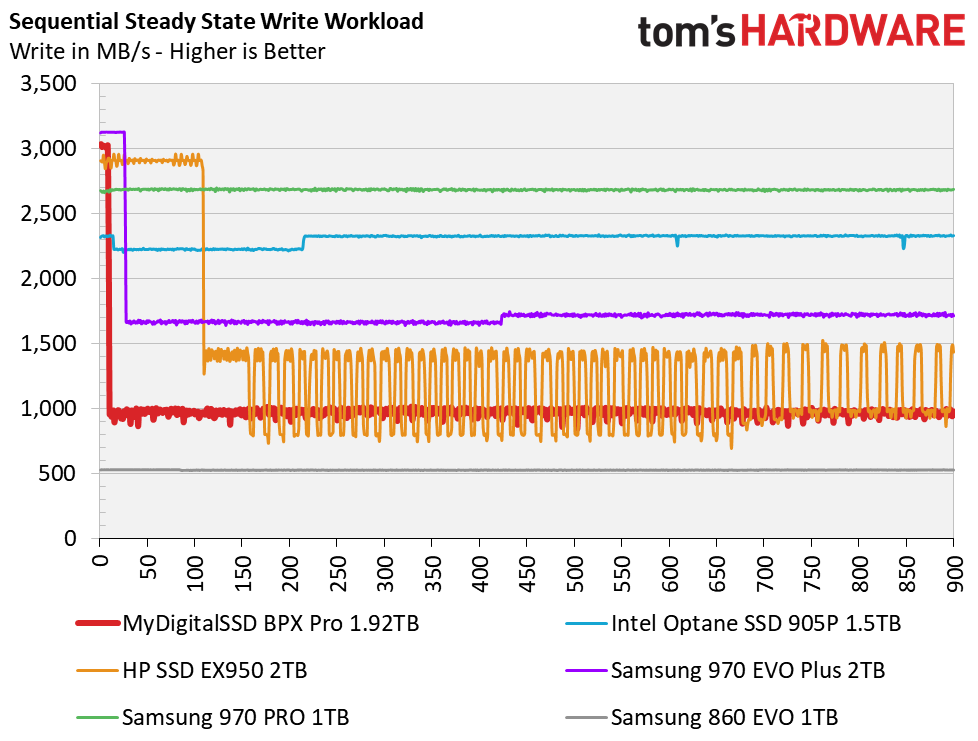
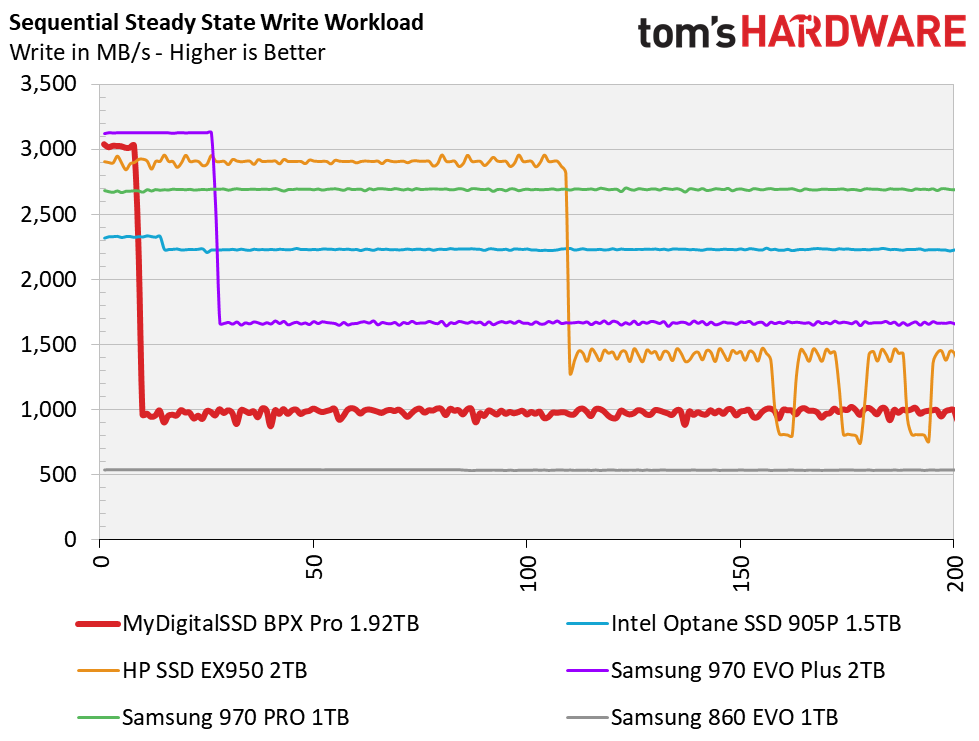
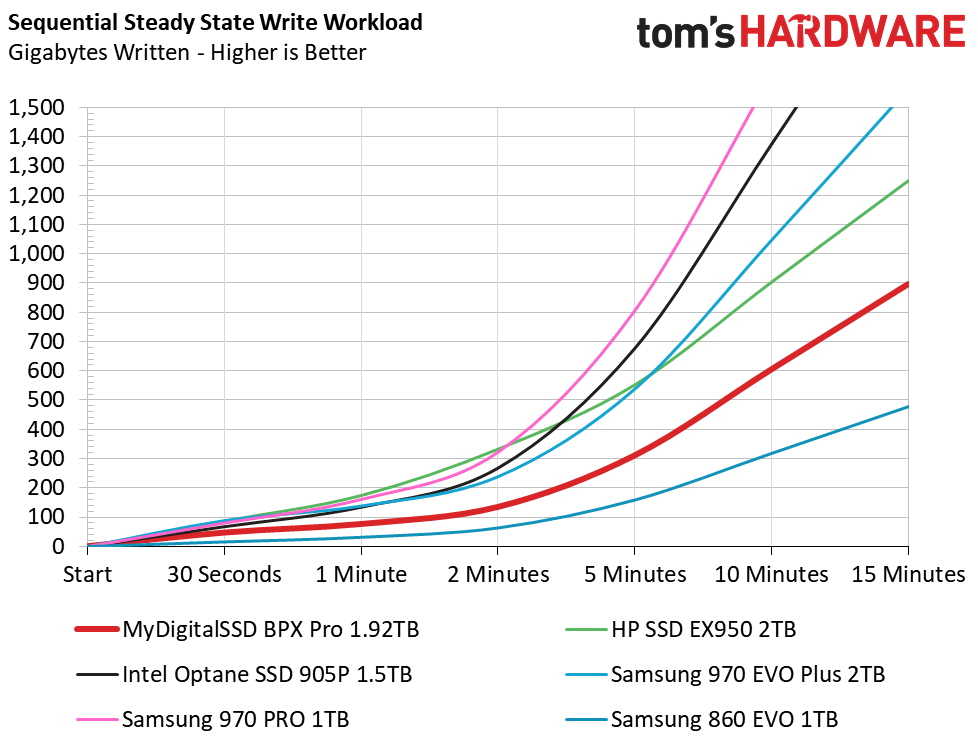
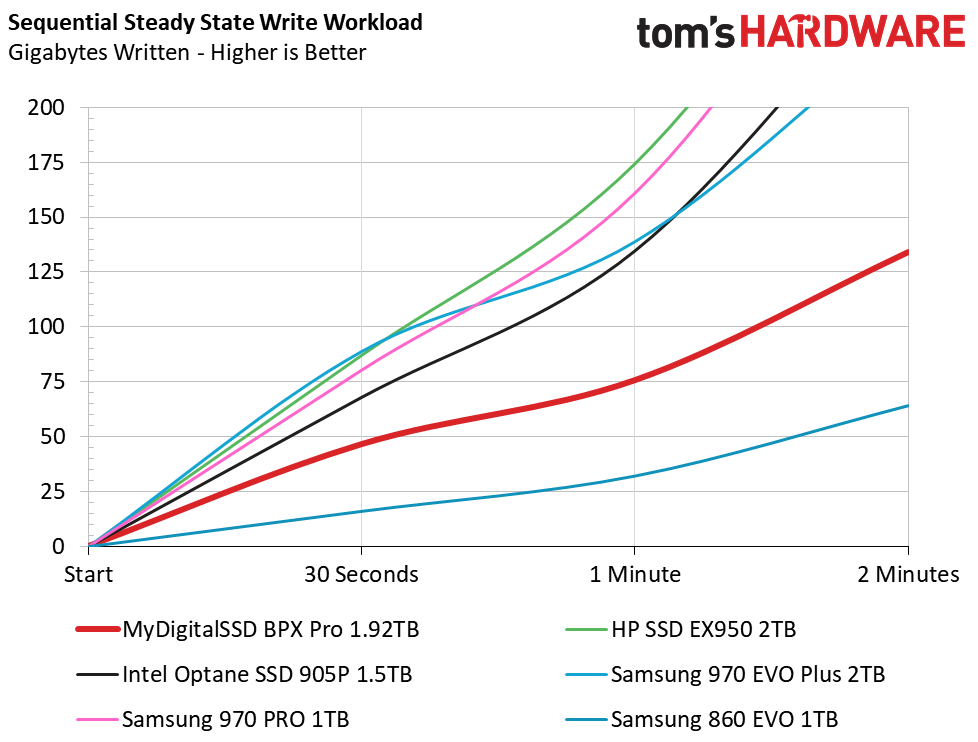
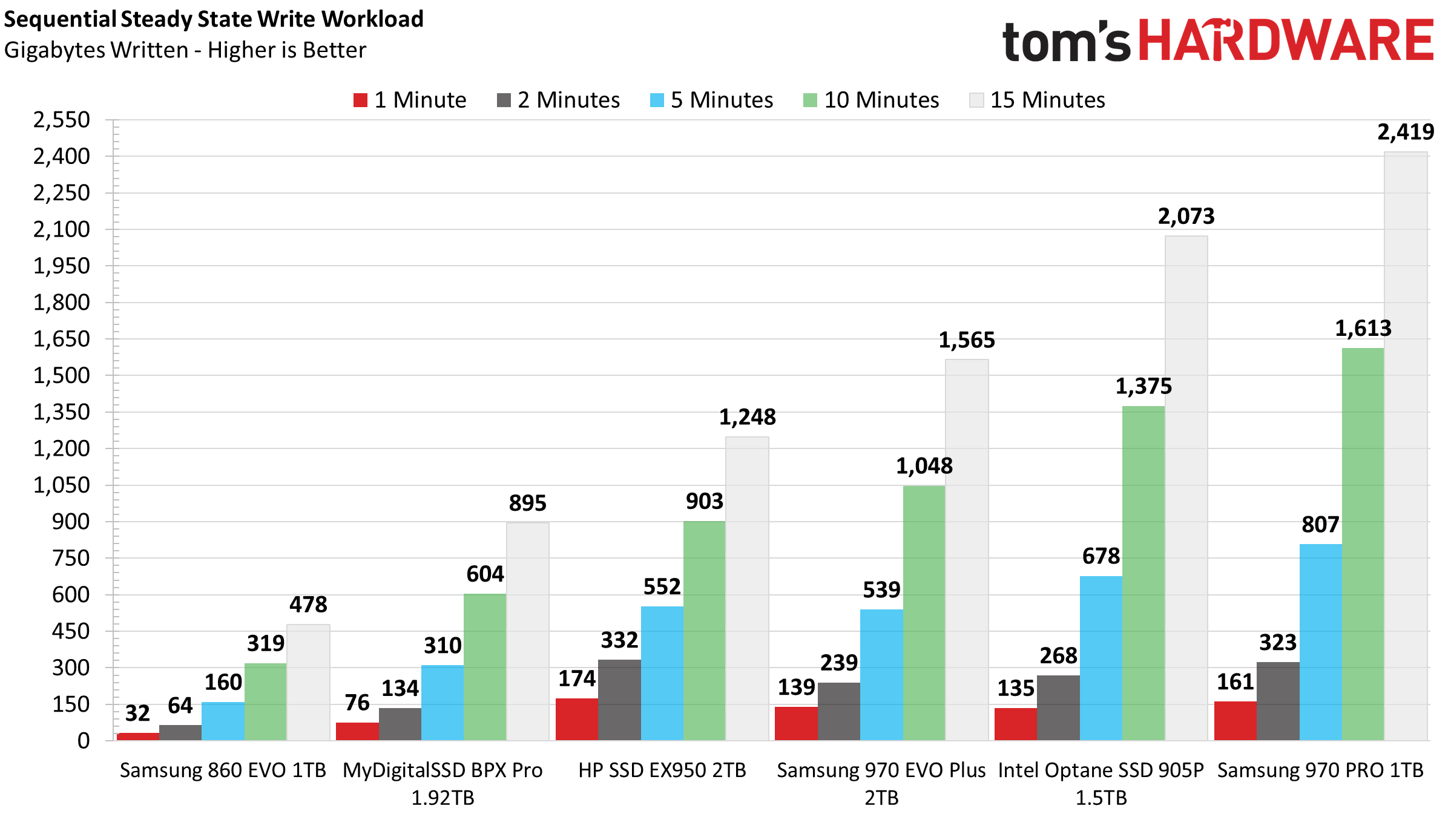
Like the 960GB model, the 1.92TB BPX Pro averages a write speed of about 1GB/s after the 24GB pSLC write cache is saturated. Overall, it comes in second to last place. It is not as fast as the HP SSD EX950’s, and it becomes apparent just how much faster other options are after just thirty seconds of writing.
Power Consumption
We use the Quarch HD Programmable Power Module to gain a deeper understanding of power characteristics. Idle power consumption is a very important aspect to consider, especially if you're looking for a new drive for your laptop. Some SSDs can consume watts of power at idle while better-suited ones sip just milliwatts. Average workload power consumption and max consumption are two other aspects of power consumption, but performance-per-watt is more important. A drive might consume more power during any given workload, but accomplishing a task faster allows the drive to drop into an idle state faster, which ultimately saves power.
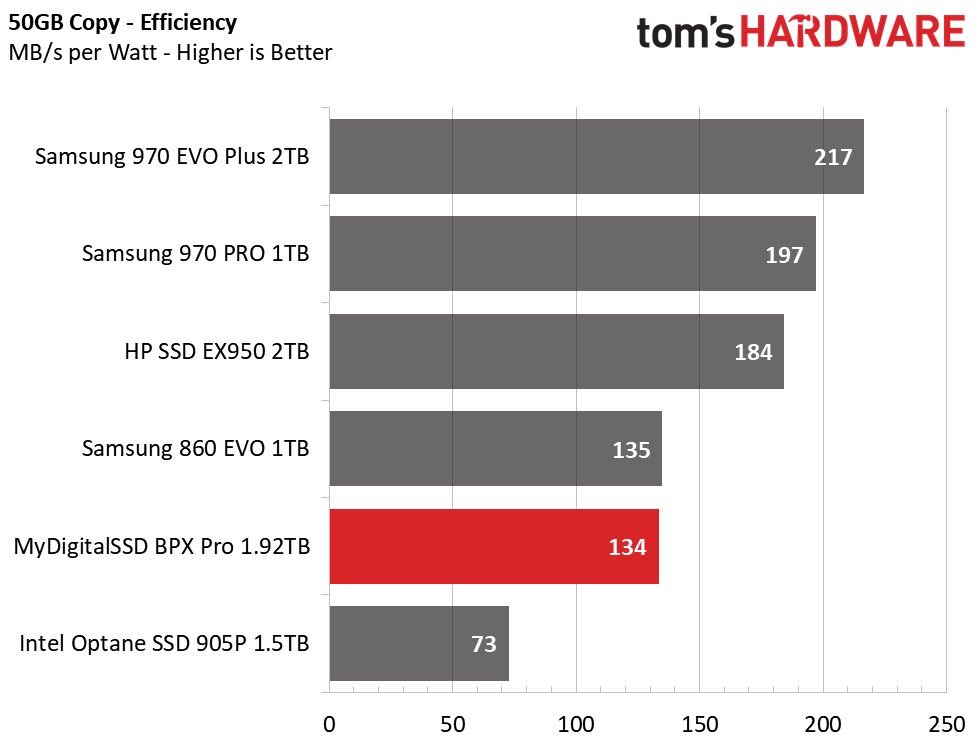
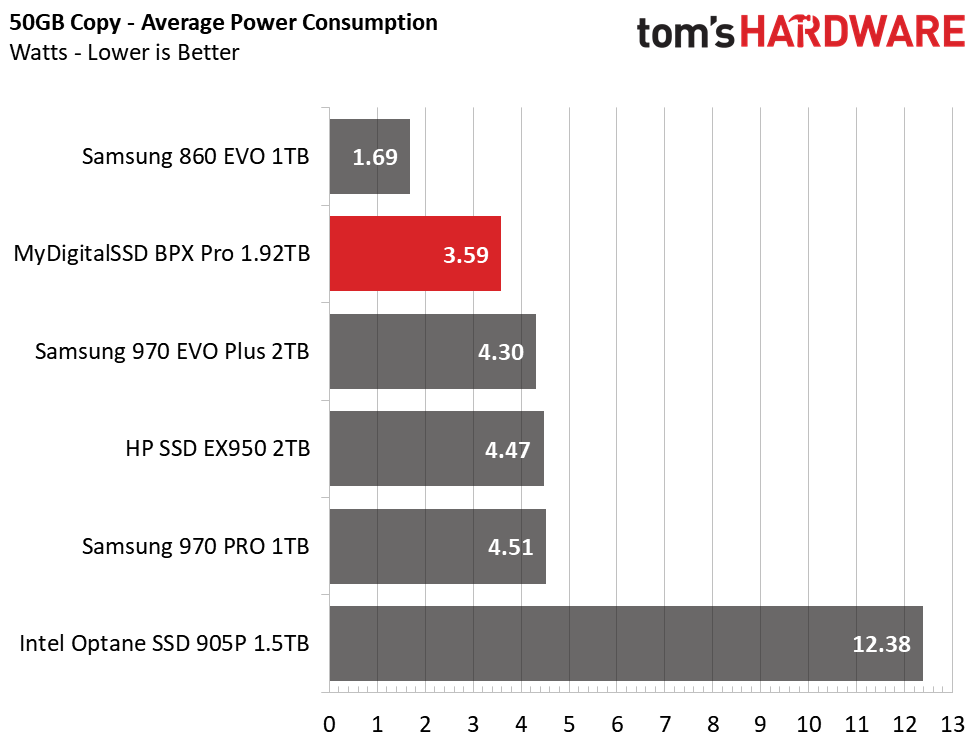
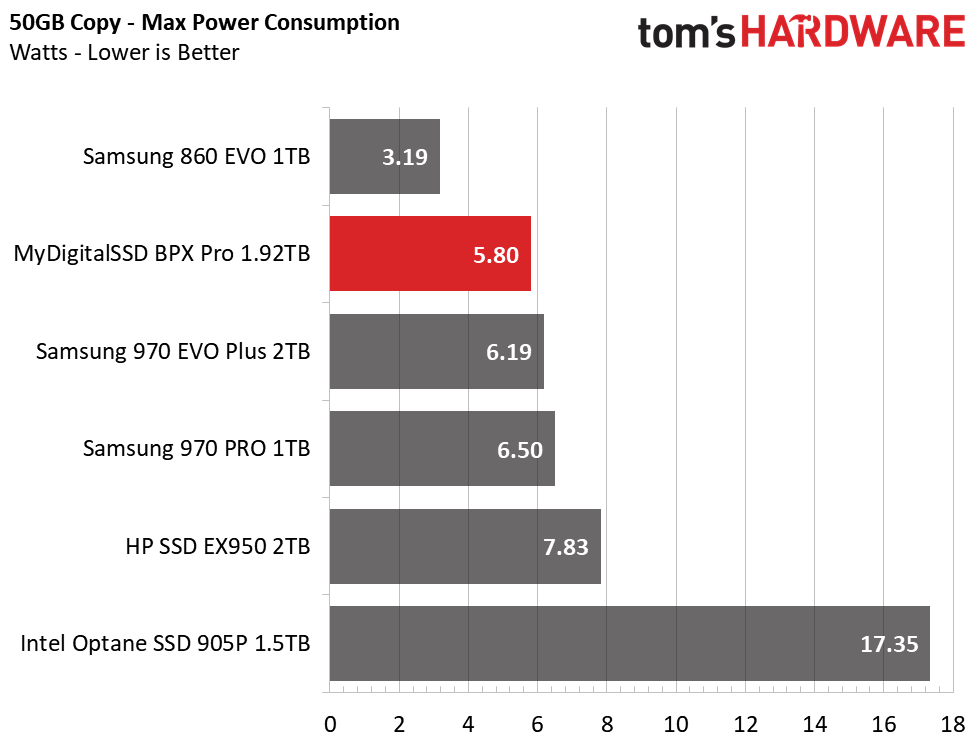
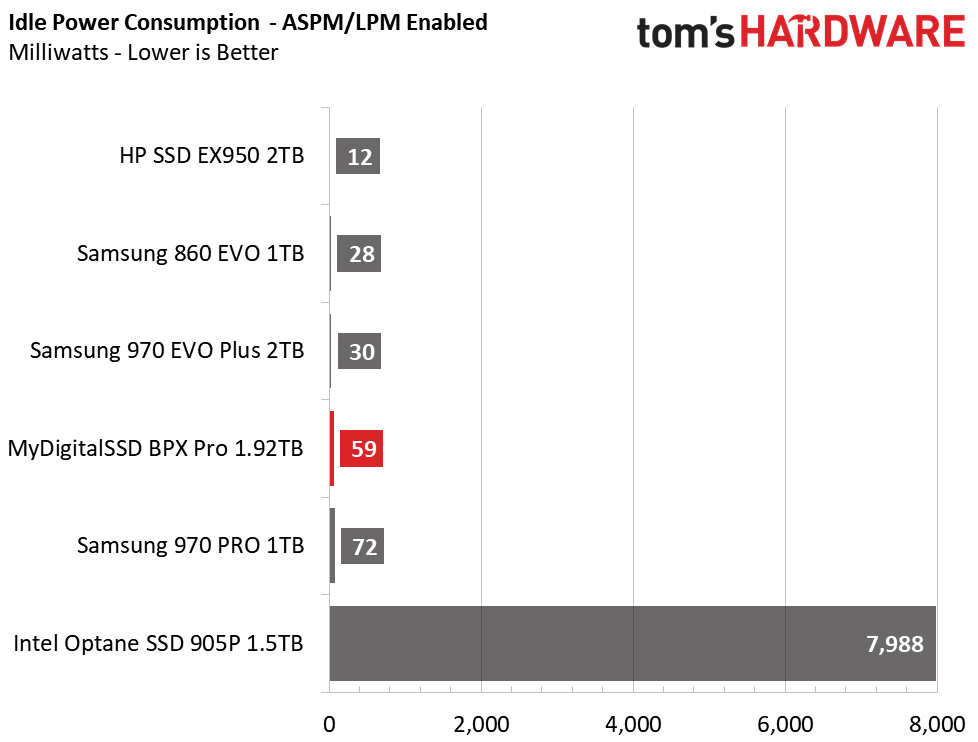
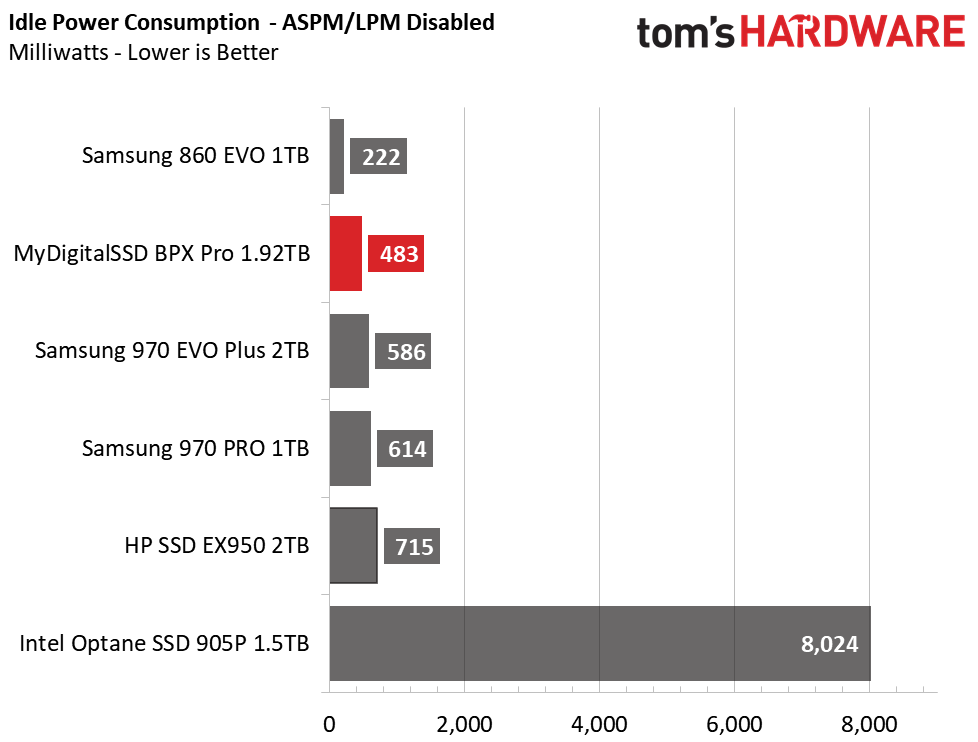
The 2TB BPX Pro’s average power consumption comes in as the second-lowest on our charts, and the same goes for max power. But, even so, a lackluster performance in transferring our files folder pulls it down the efficiency ranks to second to last place. This time, not to the Samsung 860 EVO, but rather the extremely power-hungry Intel Optane SSD 905P. Additionally, idle power consumption is low overall but could be improved upon as the HP SSD EX950 reaches lows of just 12mW at its lowest idle state in this test system.
MORE: Best SSDs
MORE: How We Test HDDs And SSDs
MORE: All SSD Content

Sean is a Contributing Editor at Tom’s Hardware US, covering storage hardware.
-
elpresidente I pre-ordered one in 960gb. Latency was worse than my xg3 from years ago- maybe tlc vs mlc difference? Was always >100us iirc, about 3x higher.Reply -
Peter Martin lower than average application performance... hello, samsung, give me an NVMe from Samsung any dayReply -
Krazie_Ivan looks like fantastic value for long-term ownership with heavy write use, which fits a niche market perfectly. i'd ideally run a smaller EVO primary for OS/apps with Magician's Turbo enabled, and paired through StoreMI to conserve space with a large HDD for large apps/games, but have this BPX Pro for vid editing use instead of a dedicated media file HDD.Reply
...just waiting on Zen2 for a dual M.2 mobo -
ron baker Turbo doesn't work on the nvme 970 ... Something they dont shout about ...means you can still run it on your old sata SSD for equiv speeds , tho .Reply -
cat1092 Just purchased the BPX PRO a couple of days ago, the 512 (480GB) version from Amazon for an amazing $129.99.Reply
If it's anything close to my three previous gen BPX drives, will be fantastic. My only issue with these, although running in PC's didn't affect me, were these probably not best suited for notebooks, as these generates heat. Mine are cooled with a Sintech PCIe adapter with 50mm fan attached. The fans has been upgraded to those with ball bearing type, as the included ones were of the sleeve or rifle type & became noisy at boot, would quieten in a minute or so.
Hopefully this newer version will run much cooler as posted in specs, so will be suitable for everyone in need of an NVMe SSD. BTW, this latest BPX PRO has been called the 'Samsung 970 EVO Killer' by an Amazon reviewer. Hopefully I'll feel the same, will be replacing a 512GB Samsung 950 PRO NVMe with the BPX PRO.